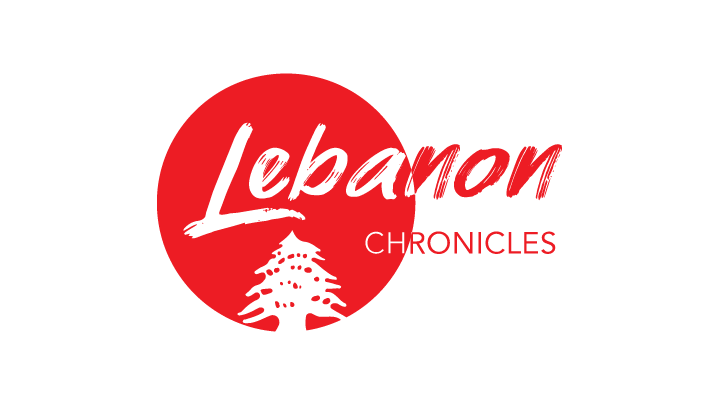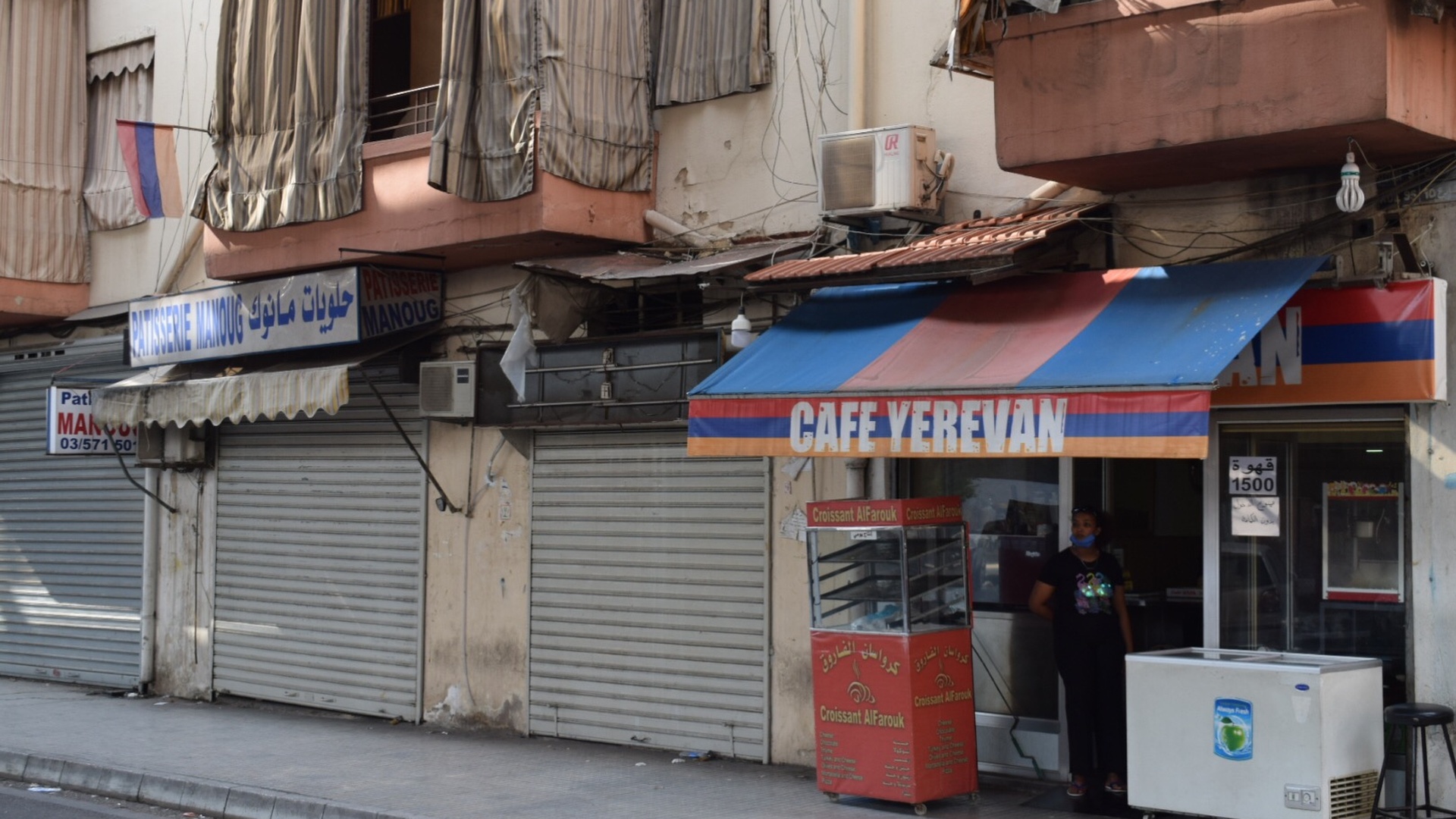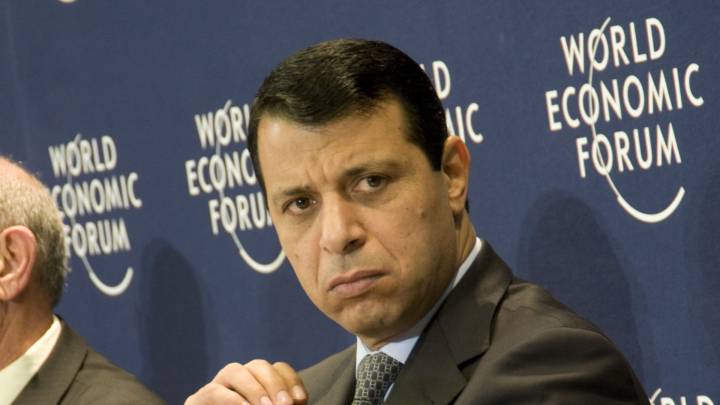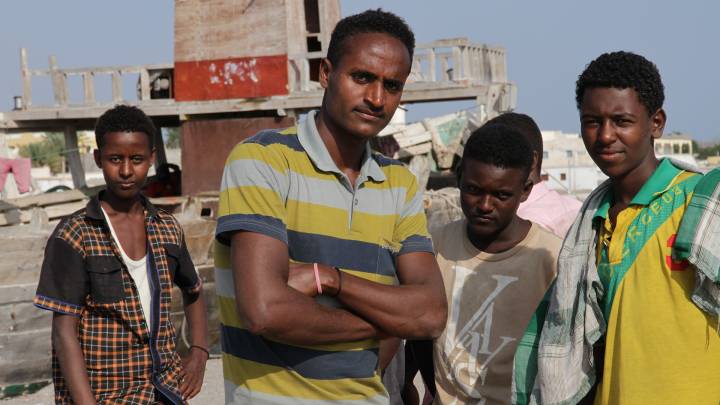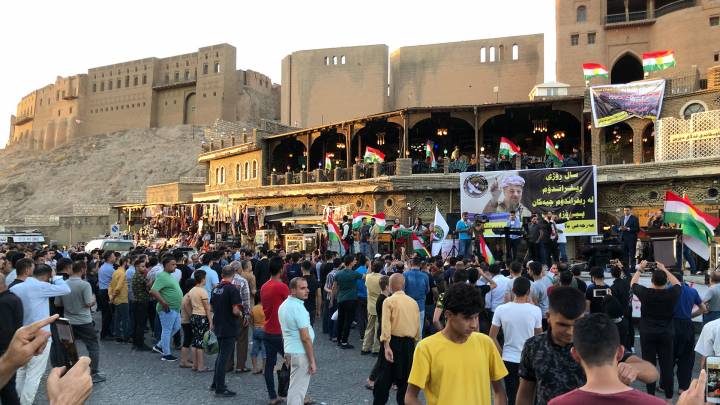The explosion in the port of Beirut hit Bourj Hammoud hard. But as residents recover, the true extent of the damage is only now becoming clear as many of the neighbourhood’s residents contemplate leaving Lebanon for good.
Bourj Hammoud is one of the Middle East’s most densely populated neighbourhoods. The characteristically narrow streets of this bustling Beirut area in the east of the city, known for its Armenian population, are a hotchpotch of tangled electricity cables, small balconies jutting out from old buildings, and fluttering red, blue and orange tricolours.
Vartkes Aghasarkissian, owner of an eponymous home appliance and electronics shop, tells of how business has suffered as a result of Lebanon’s dire economic situation, which has seen the Lebanese pound tumble in value, thousands of businesses close down, and inflation skyrocket.
The thought of leaving Lebanon has not crossed Nazely Tenbelian’s mind
“But I wouldn’t ever think of leaving,” he tells zenith assuredly. Aghasarkissian opened his first shop in Bourj Hammoud in 1952. Today, he runs a second branch housed in a much larger three-storey building on a central highway connecting Beirut to its suburbs. The store suffered considerable damage in the blast, with glassware smashing and roofs collapsing. Although Aghasarkissian, now in his 80s, has survived many years of wars, bombings and instability throughout his time in Lebanon, he remains optimistic: “We’re still standing after all these years.”
Nazely Tenbelian serves customers and responds to their enquiries, inside a spice shop on the busy Marash Street, which derives its name from the previously Armenian-majority city now located in south-eastern Turkey. The names of the neighbourhood’s streets serve as reminders of Armenians’ past, such as the ancient city of Sis, the Araxes river, Mount Aragats, or the former Armenian kingdom of Cilicia.
The history of Tenbelian Spices is slightly more recent, having been handed down through the generations of the Tenbelian family since it was founded in the 1980s. Dried fruits and vegetables of all shapes and sizes dangle from the shop’s ceiling. Dried rose petals, a variety of jams and colourful spices comprise the storefront display.
Business was booming for Tenbelian prior to the outbreak of Lebanon's economic crisis. Since then, the spice trade, like so many sectors of the country’s economy, has been hindered by tight and informal capital controls imposed by the banks. This has made it hard for the Tenbelians, and many other Lebanese, to withdraw foreign currency and bring in new goods. The devaluation of the Lebanese pound, to more than 80% against the US dollar has added insult to injury, plunging Lebanon’s once vibrant businesses into deeper crises.
In spite of the numerous trials and tribulations, the thought of leaving Lebanon has not crossed Nazely Tenbelian’s mind: “How could I turn my back and leave my home behind?”
The 55-year-old Tenbelian says they would never close down their Bourj Hammoud shop: “We haven’t thought of closing our business here and moving away. I love Lebanon. Our work and our livelihood started from right here, from Bourj Hammoud.”
Bourj Hammoud’s community resembles a close-knit family, everyone knows everyone and even in which building everyone lives. The neighbourhood, popularly dubbed “Little Armenia,” is the beating heart of the Armenian community in Lebanon. Many of its residents are descendants of those who fled eastern Anatolia, escaping the horrors of the Armenian Genocide in which around 1.5 million people were killed.
Those who settled in Beirut, a city which was still under Ottoman rule, came to Bourj Hammoud and transformed what was then swamp into a commercial and industrial hub, replete with goldsmiths, jewellers, leather manufacturers, and spice traders. After the state of Lebanon was formed in 1920, Armenians received their identity cards and became full citizens at the same time as the rest of the Lebanese people. Since then, they formed an integral part of the country’s social fabric and political life, serving in parliament and occupying government positions.
In keeping with Bourj Hammoud’s history as a haven for those fleeing their homelands, over the past ten years, Syrian refugees and migrant workers from elsewhere have begun to settle in the area. Meanwhile many Lebanese-Armenians have sold or rented out their houses there and relocated to more affluent areas in Mount Lebanon.
We had bought land in Armenia but all our plans have been put on hold
“Armenians still hold on to each other and provide each other with steady backs to rely on. You can still feel the Armenian presence,” Nazely Tenbelian explains: “Everyone says Bourj Hammoud is yours [for Armenians], I tell them Bourj Hammoud is for everyone.”
Tenbelian was minding her shop when the explosion on 4 August rocked the Lebanese capital: “I heard the wind whistling and the lights went out. My son was standing outside when I suddenly saw him pushed to the other side and onto the floor.”
Tenbelian recalls the chaotic scene that unfolded on Marash Street: screaming, confusion, and sheer terror. She had feared that the blast would cause the 80-year-old building to collapse on top of them, but all of her employees and family members managed to escape unscathed. The shop, however, looked as though it had been struck by a hurricane.
“I got so mad, and told my husband, let’s leave this country, we don’t deserve the life we’re living.” Tenbelian then tells of the many wars, bombings and assassinations she had witnessed and lived through growing up in Lebanon, from the civil war onwards.
“We’ve gone through so much over the years and then this [the blast] happened, this was unprecedented. Why should my children live through the same?”
Tenbelian, like many of her compatriots voiced her frustration over the state’s inaction and neglect: “Nobody takes responsibility. They are unempathetic. It’s like they’ve taken out their hearts and replaced them with rocks.”
Her children, now in their early thirties, are considering their options outside of Lebanon. Plans to expand the family business to Armenia have been scuppered by the capital controls which have been imposed, making transferring money abroad impossible. “We had bought land in Armenia to build a house there as well, but all our plans have been put on hold because of the situation,” said Tenbelian whose son was destined to head the business’ Armenian branch. Her daughter thinks that Canada offers the better chance of a future for her and her young family.
Something changed in me after the blast
In his tiny shop stuffed full of small sculptures, colourful necklaces, and memories captured on film, 84-year-old Ashod Tazian sits hunched smoking a narghile. The shop’s window, blown out by the force of the blast, had been replaced with plastic sheeting. The sculptor and artist was busy working on his latest piece: “I wasn’t here when the explosion happened, but I found boxes of buttons turned upside down and small blocks had fallen down.”
A sculpture depicting current Lebanese president and former general Michel Aoun in an army beret lay smashed on the floor. Its pedestal was now home to a fan. Tazian says that over recent years orders for new statues have dried up, and that he is now only charging in devalued Lebanese pounds, instead of dollars.
Tazian lives in Achrafieh, one of the neighbourhoods hit hardest by the blast, but he set up shop in Bourj Hammoud in 1980 where he has been carving sculptures ever since. His family, refugees who fled the Armenian genocide, settled in Lebanon. It is a place he says he will never leave despite the seemingly endless loop of crises that befall the country: “I’ve been to countries all around the world, there is no place like Lebanon.”
The young generation of Lebanese-Armenians do not all share Tazian’s optimism. Aline Arabaghian, a 32-year-old Bourj Hammoud resident, is moving to Armenia with her new husband. “Before getting married last year, my husband and I decided not to buy a house in Lebanon,” she tells zenith.
For Arabaghian, the emotional ties to the country of her birth run deep, but the recent explosion has only solidified the young couple’s resolve to leave the country: “The explosion made us take this step quicker, without overthinking. “Something changed in me after the blast, and I took the step more confidently.”
Armenia offers the hospital laboratory technician and her family clean water, reliable electricity, fast internet and a less polluted environment – essential services that Lebanon cannot provide - but it is still a difficult decision for Arabaghian to take: “Lebanon is my birthplace. I’ve lived here my whole life. I love Lebanon. Every corner of my neighbourhood holds a story I’ll never forget.”
Lebanese-Armenians were among many Lebanese who left the country during the civil war between 1975 and 1990 in search of safety and stability. It is that same desire today that has resulted in hundreds of families applying for visas, and long lines forming outside the Armenian embassy in Lebanon. A plane sent by Armenia carrying a cargo of humanitarian aid to the country in the wake of the explosion in the port of Beirut, returned with a very different cargo: around 150 Lebanese-Armenian families.
Narod Ketchebashian, a 22-year-old who works in social media and public relations, will relocate along with her entire family to Armenia in the Autumn. “We’ve run out of patience, we want to go somewhere where we don’t have to stress about how we’re going to make ends meet, without having to think if we’ll be alive the next day.”
Ketchebashian, like so many of her Lebanese-Armenian peers, is convinced that her future lies outside of Lebanon. “It’ll be hard for me to leave Lebanon as my entire life is here, but Armenia is our motherland.”
Houshig Kaymakamian is a journalist based in Beirut, where she reports on Lebanese politics and current affairs for The Daily Star Lebanon.
The content published on the Lebanon Chronicles channel is supported by the Konrad-Adenauer-Stiftung (KAS). The views expressed in these articles are those of the respective authors and do not necessarily reflect those of the KAS.
